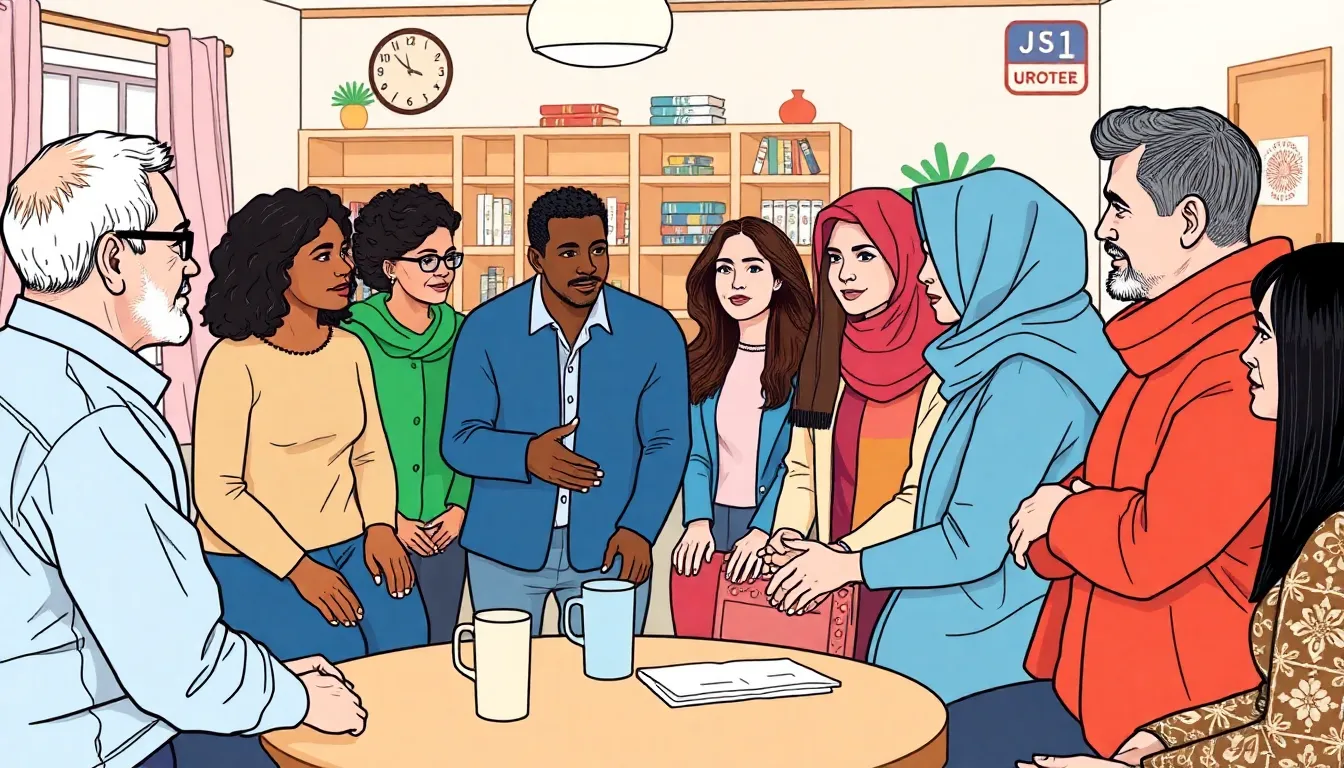Understanding complex topics like anti-Semitism can feel like trying to solve a Rubik’s Cube blindfolded. But fear not! This article breaks down the meaning of anti-Semitism in Hindi, making it accessible and engaging.
Table of Contents
ToggleUnderstanding Anti Semitism
Anti-Semitism refers to prejudice, hatred, or discrimination against Jewish people. This term encompasses a range of negative attitudes and behaviors directed at Jews throughout history.
Definition and Origins
The concept of anti-Semitism emerged in the late 19th century. It combines anti-Jewish sentiments prevalent in Europe with modern racial theories. Scholars define it as a specific form of bigotry targeting Jews based on cultural, religious, and ethnic differences. Indicators of anti-Semitism include myths about Jewish power, conspiracy theories, and scapegoating. Society observes these manifestations in various forms, from social exclusion to violent acts.
Historical Context
Anti-Semitism has deep roots in Western history. Its origins trace back to ancient times, when religious differences fueled tensions. The Middle Ages saw intensified discrimination, including the blame of Jews for the Black Plague. Various expulsions, ghettos, and violent pogroms occurred during this era. The Holocaust represents the most tragic outcome of anti-Semitism, leading to the deaths of six million Jews during World War II. This historical backdrop shows how prejudice evolves and affects communities globally.
Anti Semitism Meaning in Hindi



Anti-Semitism refers to prejudice and discrimination specifically directed at Jewish people. In Hindi, it is translated as “यहूदी विरोधी भावना.” This translation captures the essence of the term, highlighting the negativity associated with such attitudes.
Linguistic Breakdown
The Hindi phrase “यहूदी विरोधी भावना” consists of three words. “यहूदी” translates to Jewish, “विरोधी” means opposing, and “भावना” signifies feeling or sentiment. Together, these components explain the essence of anti-Semitism in a clear manner. Understanding these words helps grasp the broader implications of such sentiments in society.
Cultural Implications
Culturally, anti-Semitism influences perceptions of Jewish communities in India and beyond. Negative stereotypes and myths about Jewish individuals perpetuate discrimination in various forms. These biases impact social interactions, community dynamics, and the overall perception of Jews. India, despite its rich cultural diversity, also faces its share of challenges related to anti-Semitism. Awareness and education play crucial roles in combating these harmful beliefs and promoting understanding among different cultural groups.
The Impact of Anti Semitism
Anti-Semitism has profound effects on society and individuals. This prejudice influences social dynamics and mental health, creating significant barriers in communities.
Social Consequences
Society feels the repercussions of anti-Semitism through increased division and hostility. Hate crimes directed against Jews often lead to fear and insecurity within Jewish communities. Social isolation occurs as individuals reject those perceived as different, creating environments of exclusion. Public discourse also shifts negatively, where anti-Semitic rhetoric permeates dialogue, fostering intolerance. Communities may engage in harmful stereotypes, affecting relationships between diverse groups.
Psychological Effects
The psychological toll of anti-Semitism manifests in various ways. Victims experience anxiety and depression, particularly when exposed to hate speech or acts of violence. Fear of targeted attacks creates a pervasive sense of vulnerability, leading to long-term emotional distress. Social withdrawal often arises, as individuals seek to protect themselves from hostility. Internalizing negative stereotypes can also diminish self-worth, further impacting mental health. Awareness of these effects emphasizes the urgency for education and dialogue to promote understanding.
Combating Anti Semitism
Addressing anti-Semitism requires a multifaceted approach involving education and community engagement. Various strategies play a crucial role in dismantling prejudice and fostering understanding.
Educational Efforts
Educational programs serve as powerful tools against anti-Semitism. Schools and universities implement curricula that promote awareness about Jewish history and culture. Workshops focus on debunking myths and encouraging critical thinking about stereotypes. Youth-led initiatives often engage students in discussions about tolerance and respect. Organizations also provide resources to educators, enhancing their ability to confront anti-Semitic rhetoric in classrooms. Research indicates that exposure to diverse viewpoints significantly reduces prejudice among students.
Community Initiatives
Community initiatives strengthen ties among diverse groups while promoting dialogue and collaboration. Local organizations often host events that celebrate Jewish culture and foster interfaith dialogue. Programs centered on shared values, such as respect and inclusion, create opportunities for meaningful connections. Partnerships with law enforcement help combat hate crimes, making communities safer for everyone. Additionally, social media campaigns raise awareness and encourage individuals to stand up against anti-Semitism. Engaging community members in these initiatives cultivates a culture of empathy and support for Jewish populations.
Understanding anti-Semitism is crucial for fostering a more inclusive society. The exploration of its meaning in Hindi sheds light on the prejudice that has persisted throughout history. By examining its roots and cultural implications, readers can grasp the complexities of this issue.
Education and community engagement are vital in combating anti-Semitism. Promoting awareness about Jewish history and culture can help dismantle harmful stereotypes and encourage dialogue. As society continues to evolve, it’s essential to remain vigilant against intolerance and work towards a more understanding world. Through collective efforts, individuals can contribute to a future where diversity is celebrated, and discrimination has no place.









